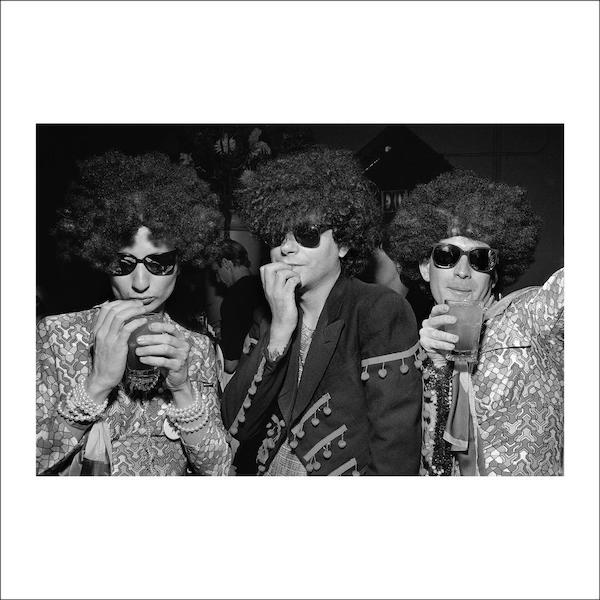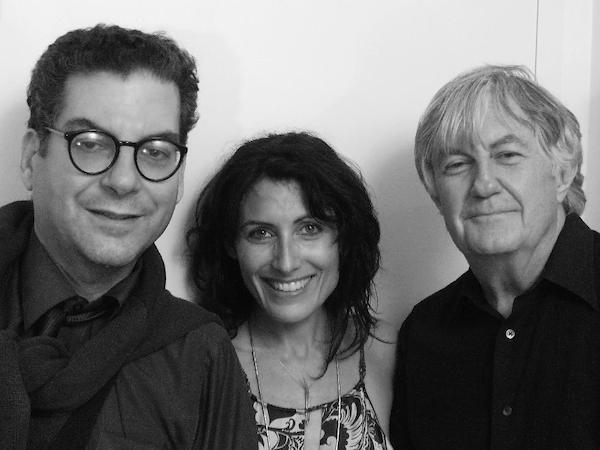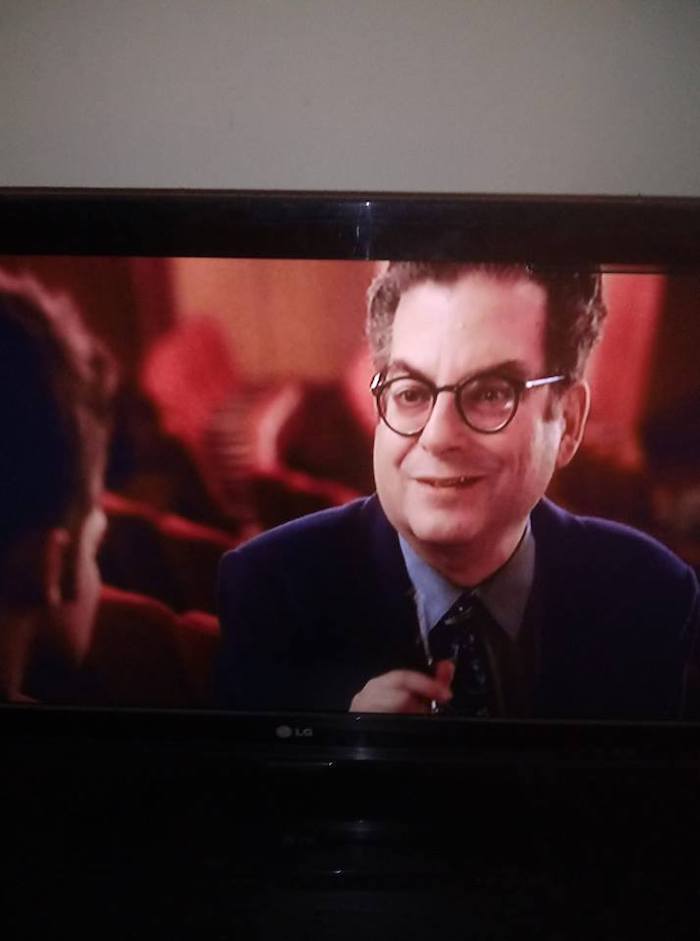
BY MICHAEL MUSTO | The entertainers featured in the Oscar-winning 2013 documentary 20 Feet From Stardom have nothing on me. I’ve gotten much closer than that! I’ve almost been able to taste fame, while self-sabotaging things just enough to underline my lack of superstar talent and confirm a seat in the bleachers.
Some of this weirdness is by design because I crave the spotlight, yet am somehow uncomfortable with it, so I routinely mess things up. But my own perfectly competent yet limited abilities come into play too, and the result is that I’ve always been sort of famous, almost famous, and kinda famous while lots of people around me soar to the top and don’t look back.
As someone who writes about celebrities for a living, it’s been healthy to realize that no matter how much notoriety I accrue, it will never be as much as they have. And when cohorts make it and become stars, I’ve learned to gently applaud them for it rather than use their success as a tool to further bludgeon myself as a failure (which the old me would have gladly done).
It’s all a rationalization to soothe myself about a life in the middle—but how did I get stuck doing this awkward dance around the flames of fame in the first place? It all started when I was a shy kid who fantasized about getting attention, but generally went unnoticed—until I started excelling as a student and aggressively participating in school activities. But interestingly, I was never #1 at any one thing. Academically, I did very well, but frustratingly enough, I never got past being ranked #3 in my high school class, after the smarter Arthur Slepian and Mary Peles. In the school orchestra, I played viola, not violin, and was OK enough to make it into in the All-City High School Orchestra, with which I actually played Lincoln Center. I thought this was some kind of big break, but absolutely no one noticed me, since I was playing a secondary instrument that people just don’t care about. They noticed the violinists!
Also in high school, I played Benny Southstreet—a supporting role—in our production of Guys and Dolls and didn’t embarrass myself, though it would be hard to do so in such a minor part. The next year, I bravely went up for the lead role, J. Pierpont Finch, in How to Succeed in Business Without Really Trying, and I pulled off a great acting audition; the whole room erupted into laughter with my line readings. But when it was time for my musical tryout, I perversely asked my rival for the part to come join me! It’s like I was courting disaster, to guarantee that I didn’t get the part and could stay in my comfort zone. And sure enough, Seth Fishman gave a better musical audition—the songs sat more comfortably in his range—and nabbed the role. I ended up playing Bud Frump, the supporting villain, as the director warned me not to act too depressed at rehearsals.
There’s more! The teacher who ran the high school paper was looking for a new editor for the next semester. In the process of interviewing students for the opportunity, she asked me what activities I was involved in, so I rattled off a long list of them, thinking I’d impress her with how fabulous I am. It turned out she wanted to make sure I wasn’t too busy to do the job. She gave it to someone else!
And that was hardly the last time rousing success eluded my grasp. At Columbia College, there were suddenly a lot of really smart students, so I was nowhere near even number three anymore. I doubt I was even top 40! I did manage to become the theater editor of the Daily Spectator—not the main editor, of course, but still! Well, one of the perks of the job was that a young Tony Kushner wrote a piece for me and was already obviously brilliant. And Kushner was nice, too—he gave me a good review when I was in a play at Barnard (in a supporting role, of course). And today? I review plays for websites while he writes Spielberg films.
Out of college, I went to a weekly acting class at HB Studios, my teacher being a wiry, eccentric guy named William Hickey. Well, I didn’t become a famous actor—in fact, the movies I cameo in generally go straight to Dropbox—but Hickey was Oscar-nominated for 1986’s Prizzi’s Honor and became one of the most visible character actors for years!
Without him in my life anymore, I fell in with two rising creatives named Marc Shaiman and Scott Wittman. I did small roles in hilarious shows that they put on in clubs in the 1980s, Marc also tinkling the keys with my Motown cover band at a nightclub event. These two were already making waves in the biz, but of course now, they’re huge, award-winning talents who scored the Broadway versions of Hairspray and Some Like it Hot. Fortunately, they still say hello.

There’s still more! With my band, I had equal billing with someone named Madonna at a club event. She was up and coming and we were obviously going nowhere. I hadn’t heard of her then, but I’ve definitely heard of her now.
At least I had my own personal documenter. Throughout the ‘80s, a Southern gentleman named Nelson Sullivan devotedly followed me with his video camera to gigs, family events, and club jaunts, and I loved having him as part of my entourage. Well, guess what? Nelson’s long gone, but he’s now legendary thanks to the fact that his exclusive ’80s footage is all over the place on YouTube. My groupie is more famous than I am!
My biggest chance for mass publicity came in the mid-‘80s, when a liqueur was searching for offbeat types to use in a massive ad campaign that would be placed in virtually every major national magazine, plus billboards. I submitted my press kit to them on request, but had to pause before including a GQ profile that hadn’t even hit the stands yet. It called me “the Duchess of Downtown,” pictured me in a hoop dress, and quoted me only semi-seriously saying that I would love to be an old-time Hollywood starlet. But I thought, “What the heck. This is part of who I am and besides, they’re looking for offbeat types!” I was thrilled when I was told I had been accepted into the campaign, but as weeks passed and they never photographed me for it, I finally was told the reason: “The Italians in charge were concerned about that GQ interview you included in the press kit.” I had been bumped and spent more than a year afraid to pick up magazines to look at other, less scary “offbeat types” being celebrated. How very me—a potential p.r triumph had turned into an agonizing defeat.
Fenton Bailey and Randy Barbato—a/k/a World of Wonder—certainly knew how to market drag in the decade that followed. The marketing duo ingeniously packaged RuPaul for stardom, breaking down many doors and obstacles along the way. Delightfully, they managed to include me in documentaries, pilots, and as a writer for a RuPaul TV special, also having booked me to sing at an Atlanta club date with Ru. But by time Fenton and Randy made it really huge with Drag Race, I had obviously aged out of their talent pool or I would have probably been considered as a judge. Another missed opportunity, courtesy of rotten timing! Fortunately, we’re still pals, and I’m always applauding.
But the pattern had clearly been set, where I fondle the brass ring, then they grab it and run away with it to the finish line. Part of the problem is that I’ve suffered from “Jack of all trades” syndrome, which doesn’t allow for any one particular victory, only a lot of little ones. Just like in school—where I wrote, acted, played viola, and was even on the Math Team (but I wasn’t the captain, naturally)—I’ve extended myself all over the place, careerwise, with my finger in every pot. It’s a chance to express myself in as many ways as possible, while also hoping that maybe the finger will chance upon some gold bullion and land me some validation. Alas, the result is usually that I’m always a bridesmaid, never the lead.
For example, I’ve covered nightlife from the beginning of my career, but my mentor, Stephen Saban (Soho News, Details), was always the bigger club writer. After all, he paved the way. Furthermore, I outed closeted celebrities in the ‘90s, but Michelangelo Signorile, who pioneered all that, was yet another mentor who (deservedly) got big recognition while I mainly got hate mail. I remember him telling me, “The L.A. Times wants to photograph me again, but they should just use the photos they already have!” I had no such problems.
Also in the ‘90s, I was one of the main tattling correspondents on The Gossip Show on E!, but the channel singled out another correspondent, A.J. Benza, for stardom. They made Benza—a fellow Italian-American from my old neighborhood of Bensonhurst, Brooklyn—the high-profile host of Mysteries & Scandals, while I was stuck just being the proverbial catty water carrier. As Benza became big by deadpanning “Fame, ain’t it a bitch?,” I thought, “Gee, I don’t know, but I’d love to find out!”

As I mentioned, I also write about theater, and as a result, I was a longtime presence on the TV show Theater Talk. When the behind-the-scenes theater drama Smash (another Shaiman/Wittman project) turned up on NBC in 2012, I was hoping to get cast as myself, a role I was pretty sure I could handle. Sure enough, I eventually made it, but then the series got canceled, so my performance ended up onSmash’s very last two-hour showing. What’s more, the finale aired opposite Behind the Candelabra, the highly anticipated Liberace movie starring Michael Douglas, so no one even DVR’d it, lol.
I’ve also been virtually trimmed out of a big movie and there was the time I landed a major commercial, only to have to turn it down because of an AFTRA strike. But in my newfound wisdom, I now realize that everyone has setbacks—even Meryl Streep and maybe even her daughters. Basically, I’ve done fine and made decent decisions, and I’ve even had periods when people chased me down the street for an autograph. And there’s something to be said for the integrity of staying just left of center. Ages ago, New York magazine tried to hire me away from the Village Voice and I rejected them, which, in retrospect, was totally the right way to go, despite this being a bigger job. I knew I’d feel self-conscious writing for a publication that wouldn’t allow the fun fearlessness that the Voice gave me, and besides, I was sure it wouldn’t last.
And though I might be torn between being terrified of large success and also feeling unqualified for it, maybe I’m comfortable right where I am. As a song in the musical [title of show] says, “I’d rather be nine people’s favorite thing/Than 100 people’s ninth favorite thing.” And I’m sticking with that theory!
—END—

Michael Musto is a columnist, pop cultural and political pundit, NYC nightlife chronicler, author, and the go-to gossip responsible for the long-running (1984-2013) Village Voice column, “La Dolce Musto.” His work appears on this website as well as Queerty.com and thedailybeast.com, and he is writing for the new Village Voice, which made its debut in April of 2021. Follow Musto on Instagram, via @michaelmusto.
Chelsea Community News is an independent, hyperlocal news, arts, events, info, and opinion website made possible with the help of our awesome advertisers and the support of our readers. Our Promise: Never a paywall, no pop-up ads, all content is FREE. With that in mind, if circumstances allow, please consider taking part in our GoFundMe campaign (click here). To make a direct donation, give feedback, send a Letter to the Editor, or contact our founder/editor, email Scott Stiffler via scott@chelseacommunitynews.com.
To join our subscriber list, click here. It’s a free service providing regular (weekly, at least) Enewsletters containing links to recently published content. Subscribers also will be sent email with “Sponsored Content” in the subject line. That means it’s an exclusive message from one of our advertisers, whose support, like yours, allows us to offer all content free of charge.

You must be logged in to post a comment Login